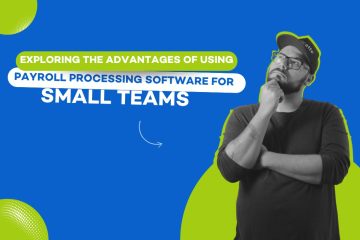Introduction
Payroll processing is a crucial yet often time-consuming task for businesses, regardless of their size. Tracking employee hours, calculating taxes, and generating pay slips are complex tasks that need accuracy. Manual payroll processing can lead to errors, inefficiencies, and higher costs. That’s why many businesses now rely on payroll processing software to streamline their operations. This software automates payroll tasks, ensuring accuracy and compliance. In this blog, we will explore how payroll processing software simplifies business operations and why it is a necessity for today’s fast-paced business world.
The Growing Need for Payroll Processing Software
As businesses expand, managing payroll becomes more complicated. Tracking overtime, benefits, tax deductions, and maintaining compliance can become overwhelming. Manual processing often results in costly mistakes, leading to fines or disgruntled employees. Payroll processing software offers a solution to these challenges by automating every aspect of payroll management.
1. Elimination of Payroll Errors
Manual calculations are prone to errors, especially when managing a large workforce. Payroll software automates the process of calculating wages, overtime, and deductions. Businesses benefit by avoiding common mistakes, such as underpayment or over payment. By doing so, they also protect themselves from legal issues, as compliance with local and federal tax laws is ensured.
2. Automation and Time-Saving
By automating payroll tasks, the software dramatically reduces the time spent on payroll processing. Businesses no longer need to spend hours calculating wages, taxes, or preparing pay slips. Instead, the system handles these tasks automatically, allowing HR and finance teams to focus on more strategic activities. Furthermore, direct deposit features save time and ensure timely payments, improving employee satisfaction.
Key Features of Payroll Processing Software
To better understand how payroll software simplifies operations, let’s explore its essential features:
Automated Payroll Calculations
One of the most significant features of payroll software is the automation of payroll calculations. The software automatically calculates wages based on work hours, overtime, and deductions, ensuring accurate payroll. This helps eliminate the need for manual intervention and reduces human error.
Ensuring Tax Compliance
Keeping up with constantly changing tax regulations can be daunting. Payroll software ensures compliance by automating tax calculations and deductions. It stays updated with the latest tax laws and generates tax forms accordingly. Businesses, in turn, avoid penalties and fines by ensuring compliance with tax authorities.
Direct Deposit and Payment Management
Managing payroll payments can be a hassle. Payroll software simplifies the process by offering direct deposit features. Businesses can transfer wages directly to employee bank accounts, reducing the need for manual checks and saving on printing and postage costs.
Employee Self-Service Portals
Employees appreciate easy access to their payroll information. Most payroll processing software comes with employee self-service portals. These portals allow employees to access their pay slips, tax forms, and other relevant documents, thus reducing the administrative workload on HR teams.
Integrated Time and Attendance Tracking
Payroll software often integrates with time-tracking systems, ensuring accurate payroll calculations. By automatically recording work hours and leaves, businesses can guarantee accurate compensation for employees without manually checking time sheets.
Cost and Time Benefits of Payroll Processing Software
1. Cost Reduction Through Automation
Automating payroll tasks not only saves time but also reduces costs associated with manual labour and errors. Businesses no longer need large HR teams dedicated to processing payroll, allowing them to save on salaries and benefits. Additionally, payroll software reduces the risk of fines due to non-compliance, which can otherwise lead to significant financial losses.
2. Increased Employee Satisfaction
Payroll errors or delayed payments can cause employee dissatisfaction. Payroll software eliminates these problems by ensuring that employees are paid accurately and on time. Moreover, with self-service portals, employees can access their payroll information at any time, reducing their need to contact HR for assistance.
3. Improved Compliance and Legal Protection
Payroll laws and tax regulations change frequently. Manually keeping track of these changes can be risky, as non-compliance can result in hefty penalties. Payroll software ensures that businesses stay compliant with local and federal regulations by automatically adjusting calculations in line with changes in tax laws.
4. Reduced Administrative Burden
Payroll processing can take significant time and resources when done manually. Payroll software reduces the administrative burden by automating complex tasks, from calculating wages to filing taxes. This allows HR personnel to focus on more important tasks, such as employee engagement and strategic planning.
Best Practices for Implementing Payroll Software
To maximize the benefits of payroll software, businesses must choose the right solution. Here are a few things to consider:
- Ease of Integration
Ensure the payroll software integrates with your existing HR and accounting systems. Seamless integration ensures smooth workflows and eliminates the need for manual data entry across different systems. - User-Friendly Interface
Look for software that is easy to use for both HR personnel and employees. A user-friendly interface minimises training requirements and ensures that your team can use the software efficiently from day one. - Scalability
As your business grows, your payroll needs will change. Choose a payroll software solution that can scale with your business, accommodating additional employees, tax requirements, and integrations. - Support and Updates
Reliable customer support is essential when implementing payroll software. Choose a provider that offers strong customer service and regular software updates to keep your system current with tax laws and compliance requirements.
Conclusion
In today’s competitive business environment, automating payroll processes is no longer a luxury but a necessity. Payroll processing software not only saves businesses time and money but also ensures compliance with tax regulations, improves employee satisfaction, and reduces administrative burdens. For companies in Delhi, partnering with the best software company in Delhi, such as DI Infotech, provides access to tailored payroll solutions that can streamline operations and drive growth. Investing in payroll software will simplify business processes, reduce costs, and help ensure your company remains compliant and efficient.



0 Comments